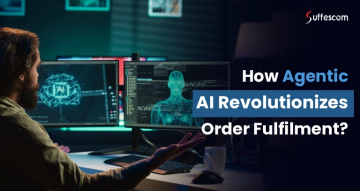Generative AI in Drug Discovery: Transforming Healthcare Industry

AI knows no limitations. Technology is penetrating every industry possible, even in pharmaceuticals and drugs. One of the most interesting applications is the development of generative AI in drug discovery.
Before we jump right into understanding this application, it is essential to understand;
The Overview of Generative AI
A type of artificial intelligence that can develop fresh content ranging from text to videos. Using specific algorithms, generative AI (gen AI) develops content such as audio, images, code, videos, and text. Since its breakthrough, the content creation has witnessed drastic changes constantly, and many generative AI development services are on the rise!

What are Generative AI Drugs?
Generative AI drugs are pharmaceutical compounds developed using generative AI. Gen AI algorithms get training using a variety of large amounts of data, including clinical trial results, chemical structures, and biological interactions.
Applications of Gen AI in Drug Discovery
There are five significant applications of generative AI in drug discovery-
Molecule and Compound Generation
Gen AI can-
- Develop novel and valid molecules: Gen AI algorithms train 3D molecule shapes and their features to create novel molecules with essential characteristics.
- Execute multi-objective molecule optimization: Models trained using chemical reaction data predict interactions between chemical compounds and updates on molecule properties that balance profile as per synthetic feasibility, potency, and safety.
- Screen Compounds: Gen AI in drug discovery produces a wide set of virtual compounds and assists researchers in evaluating against biological targets and looking for optimal fit.
Biomarker Identification
Biomarkers are molecules that state-specific processes in the human body. These markers identify where the body is acting normally and where a disease is present.
The role of generative AI is to study vast genomic and proteomic datasets to identify promising biomarkers corresponding to different diseases and then look for these indicators in patients.
Algorithms can identify biomarkers in medical images, such as MRIs, CAT scans, and other types of patient data.
Drug-Target Interaction Prediction
Generative AI algorithms simulate molecule interactions and predict the interaction strength between protein targets and drug compounds. How does it happens? Learning and training from data structures, gene expression profiles, and drug-target interactions enable this.
Additionally, gen AI rapidly runs target proteins against multiple libraries of chemical compounds to search existing molecules that are bound to the target. If nothing comes out, they might generate novel compounds and test their interaction strength.
Drug Repurposing and Combining
With gen AI, it is pretty much possible to repurpose or combine the application of a drug. Reusing the existing drug is quicker than choosing the conventional drug development methodology. Moreover, these drugs are pre-tested and have a defined safety profile.
Also, gen AI in drug discovery predicts which drug combination is most effective for treating a disorder.
Drug Side Effects Prediction
Top of all, the most promising application of the role of generative artificial intelligence in drug discovery is predicting the drug's side effects. Gen AI models collect data and simulate molecule interactions to predict the possible side effects and the chances of their occurrence.
This provision allows the scientists or researchers to choose the safest options. Gen AI follows the following five methods to predict the side effects;
- Predicting chemical structures
- Analyzing biological pathways
- Integrating omics data
- Predicting adverse events
- Detecting toxicity
Best Generative AI Development Services are Just a Click Away!
Your search for best-in-class generative AI development services ends at Suffescom Solutions. Connect now to explore the best services, from generative AI consulting to development.
The Role Of Generative AI in Each Stage Of The Drug Discovery Process
Any process that a generative AI development company follows has the below components mentioned in the table. Learn how the gen AI model improves the process.
| Components of the Drug Discovery Process | Role of Gen Artificial Intelligence in Drug Discovery |
| Target Identification | Predicting functions and integrations of genes, proteins, and pathways for vital insights for targeting disease mechanisms. |
| Lead Discovery | AI models like GANs and RNNs accelerate the discovery of lead compounds by predicting their pharmacological properties to streamline the selection of promising candidates. |
| Lead Optimization | Optimizing lead compounds and proposing molecular modifications to enhance therapeutic effectiveness and safety. |
| Preclinical Testing | Generative AI interprets large datasets to assess safety, efficacy, and toxicity. |
| Clinical Trials | Analyzes patient data for suitable trial candidates and optimizes trial protocols. |
| Regulatory Review | AI automates the data analysis to ensure comprehensive and proper evaluation for drug approvals. |
| Post-Market Surveillance | AI systems continuously monitor for adverse effects and safety concerns. |
How are Generative AI Systems Impacting Drug Discovery?
The implementation of gen AI in drug discovery is bringing some promising changes.
Increase in Efficiency and Speed
Generative AI models accelerate drug discovery by creating vast libraries of virtual compounds. It allows the researchers to focus on promising options.
Targeting Particular Diseases
Generative AI systems get training on datasets of eminent drug-target interactions, which allows these models to predict drug candidates for specific diseases. This approach enables research to identify novel compounds that have higher chances of treating specific conditions.
Less Data Limitations
Traditional drug discovery faces data limitations that restrict innovation. Meanwhile, gen AI in drug discovery reduces this by learning from existing data and creating new data sources. This data trains models and improves accuracy, leading to efficient drug discovery results.
Better Collaboration
Gen AI models improve collaboration and knowledge transfer. Research exchange ideas, discuss findings, and collaboratively work on solving complex problems associated with drug discovery.
Personalized Therapies
Gen AI algorithms are easy to program to focus on particular disease targets or mechanisms. This provision enables drug development to cater to individual patients or specific diseases and increases the treatment's efficiency.

Case Studies - Generative AI in Drug Discovery
Insilico Medicine
Problem statement - Higher costs and time in developing a drug for idiopathic pulmonary fibrosis, a rare disease that causes progressive lung decline. The traditional solution would have taken 6 years and more than $400 million.
Solution - Insilico employed generative AI models at each step of the preclinical drug discovery process, including;
- Identifying target molecules
- Generating novel drug candidates
- Predicting clinical trial outcomes
Effects - With generative AI, Insilico reduced the cost to 1/10th and the time to 2.5 years. The company developed an AI-generated COVID-19 drug that is effective against all variants. The organization initiated over 30 other programs targeting various diseases, including cancer.
Deloitte
Problem Statement - Lengthy and costly drug development processes
Solutions - Deloitte introduced NVIDIA-powered Atlas AI, a solution leveraging generative AI models and NVIDIA's BioNeMo cloud APIs to fasten the process of identifying potential drug candidates by rapidly generating 3D biomolecular structures and predicting drug-to-protein binding.
Effects - This approach aims to reduce research time and costs, expediting the delivery of new pharmaceuticals to market. Additionally, Atlas AI-enhanced efficiency throughout the drug discovery process with data-driven insights from gene to function.
Bonus Read - How Much Does it Cost to Build a Generative AI
What are the Challenges Associated with Generative AI in Drug Discovery?
Undoubtedly, innovation improves processes, but it comes with a specific set of challenges. Let’s understand the other side of the story.
Vague Model Explainability
Generally, generative AI models do not explain how they work. In multiple cases, the medicine researchers must know why the model makes a specific recommendation. It is essential to understand the logic if a model establishes any drug as toxic.
Model Inaccuracy
Generative AI is still a work in progress as it can present doubtful information as entirely accurate. Inaccuracy is concerning and challenging as the researchers cannot trust generative AI models in drug discovery.
Bias and Limited Inclusivity
Gen AI models trained on incomplete or biased data bring inappropriate results. In the context of drug discovery, if an algorithm is trained on a dataset with one dominant type of molecule properties, it will produce similar molecules, hence reducing diversity.
High Infrastructure and Computational Costs
A wise choice is to retrain an open-source solution rather than develop a gen AI model from scratch, which is extremely expensive. In the same alternative, the expenses associated with computation power and infrastructure stay higher.
Limit the Gen AI Challenges with a Leading Generative AI Development Company
Suffescom Solutions delivers the best generative AI development services that not only overcome common gen AI challenges but ensure scalability. Work with a promising generative AI development company. Connect now!
Busting Myths About Generative AI
| Myth | Reality |
| Gen AI is a fresh concept | Experiments with generative AI started back in the 1960s. |
| Gen AI will replace human jobs | Gen AI automates tasks and enhances human capabilities. |
| The bigger the AI model, the better | Quality of training data matters. |
| Gen AI will enable plagiarism | Similarity with human content is a concern that entirely depends upon the user's intent. |
| Gen AI only develops images and text | From drug discovery to music creation, Gen AI is not limited to creating text and images only. |
What’s the Future of Drug Development with Gen AI Models?
The present stage of generative AI in drug discovery paves the way for a promising future, especially in drug development. This innovation promises reliable cures for various diseases at minimum costs. A future where drug development is faster and more efficient is just around the corner.
Considering the constant innovation and technological advancements, generative AI in the drug industry can be a game-changer. It promises better outcomes for patients and researchers worldwide.
FAQs
1. How is generative AI used in drug discovery?
There are multiple applications of generative AI in drug discovery, such as molecule and compound generation, biomarker identification, drug-target interaction prediction, drug repurposing and combining, and drug side effects prediction.
2. What are the potential benefits of GenAI in drug discovery?
The usage of gen AI in drug discovery has a lot of benefits to offer, such as an increase in efficiency and speed, efficiently targeting particular diseases, reducing data limitations, ensuring better collaboration, and developing personalized therapies.
3. Which is the most common application of generative AI in drug discovery?
Out of all the applications or roles of artificial intelligence in drug discovery, the most common ones are molecule and compound generation.
4. Which is the best generative Al development company?
Suffescom Solutions is the best choice among the rest when it comes to choosing an AI development company. With over a decade of experience and expertise, we have built market-leading gen AI models for multiple businesses across various industries.







